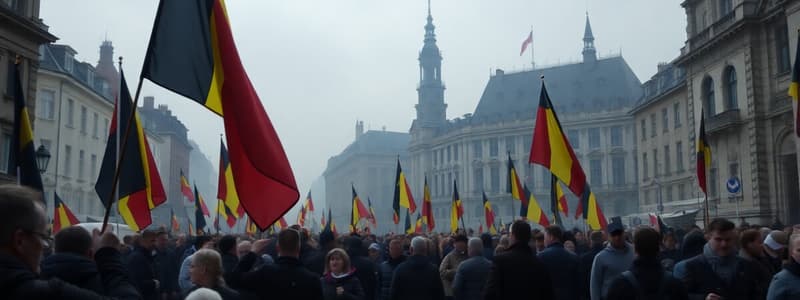Podcast
Questions and Answers
When did the Belgian Revolution occur?
When did the Belgian Revolution occur?
1830
What was the primary reason for creating the United Kingdom of the Netherlands in 1815?
What was the primary reason for creating the United Kingdom of the Netherlands in 1815?
- To unite the Dutch and Belgian cultures.
- To implement a more democratic form of government.
- To promote economic integration between the North and South.
- To create a strong barrier against France. (correct)
What is the term used to describe the policy of promoting the Dutch language in the South?
What is the term used to describe the policy of promoting the Dutch language in the South?
Dutchification
Which of the following contributed to the economic crisis in 1828?
Which of the following contributed to the economic crisis in 1828?
The Belgian Revolution began as a movement for social and economic reform by both liberals and Catholics in the South.
The Belgian Revolution began as a movement for social and economic reform by both liberals and Catholics in the South.
The Provisional Government of Belgium was established through a democratic election process.
The Provisional Government of Belgium was established through a democratic election process.
What type of government did the National Congress choose for Belgium?
What type of government did the National Congress choose for Belgium?
The 1831 Belgian Constitution included the freedom of the press, equality before the law, and the inviolability of person and property.
The 1831 Belgian Constitution included the freedom of the press, equality before the law, and the inviolability of person and property.
Why was Prince Leopold of Saxe-Coburg-Gotha chosen as the King of the Belgians?
Why was Prince Leopold of Saxe-Coburg-Gotha chosen as the King of the Belgians?
The Treaty of the XXIV Articles recognized Belgium's independence and established its neutrality.
The Treaty of the XXIV Articles recognized Belgium's independence and established its neutrality.
Belgium's existence was threatened by Napoleon III's ambition to annex it.
Belgium's existence was threatened by Napoleon III's ambition to annex it.
The Belgian state and the Flemish-Walloon opposition have resulted in a weakening of national unity since 1945.
The Belgian state and the Flemish-Walloon opposition have resulted in a weakening of national unity since 1945.
Flashcards
United Kingdom of the Netherlands
United Kingdom of the Netherlands
A short-lived political union of the Austrian Netherlands and the United Provinces created in 1815 by the Congress of Vienna.
Belgian Revolution of 1830
Belgian Revolution of 1830
The revolution that led to the creation of the independent Belgian state, breaking away from the United Kingdom of the Netherlands.
Congress of Vienna
Congress of Vienna
A major international conference in 1815 that redrew the map of Europe after the Napoleonic Wars.
William I
William I
Signup and view all the flashcards
Restoration
Restoration
Signup and view all the flashcards
Ancien Régime
Ancien Régime
Signup and view all the flashcards
Liberalism
Liberalism
Signup and view all the flashcards
Nationalism
Nationalism
Signup and view all the flashcards
Dutchification
Dutchification
Signup and view all the flashcards
Industrial Revolution
Industrial Revolution
Signup and view all the flashcards
Social Question
Social Question
Signup and view all the flashcards
London Conference
London Conference
Signup and view all the flashcards
Treaty of the XVIII Articles
Treaty of the XVIII Articles
Signup and view all the flashcards
National Congress
National Congress
Signup and view all the flashcards
Leopold I
Leopold I
Signup and view all the flashcards
Bourgeoisie
Bourgeoisie
Signup and view all the flashcards
Census Suffrage
Census Suffrage
Signup and view all the flashcards
Union des Oppositions
Union des Oppositions
Signup and view all the flashcards
Orangism
Orangism
Signup and view all the flashcards
Provisional Government
Provisional Government
Signup and view all the flashcards
Military Intervention
Military Intervention
Signup and view all the flashcards
Study Notes
Belgium's Formation
- Belgium's independence stemmed from the 1830 revolution, though it had existed as a political entity earlier.
- The Belgian Revolution ended the brief union of the Northern and Southern Netherlands in the Kingdom of the Netherlands (1815).
- This event was influenced by factors including the dismantling of the Ancien régime, modernization, the French July Revolution of 1830 (with favorable international circumstances).
United Kingdom of the Netherlands
- In 1815, the Congress of Vienna formed the United Kingdom of the Netherlands, uniting the Austrian Netherlands and the former Republic of the Seven United Provinces.
- The new state comprised recently French-held territories, including the Prince-Bishopric of Liège.
- This union faced opposition due to differing religious and linguistic characteristics between the Northern and Southern parts.
- The unified state experienced central rule under King William I, despite having a constitution ensuring freedom of rights.
Opposition and Revolt
- Economic hardship and centralized rule triggered opposition, leading to a growing crisis.
- Differences in language, religion, and economic development contributed to increasing tensions between North and South.
- This led to the formation of a coalition of liberals and Catholics in response to King William I's policies (opposed to the new regime's centralisation).
Belgian Revolution
- The Belgian Revolution saw growing unrest, triggered by a significant event, culminating in the Brussels Monnaie theatre.
- This initial unrest spread quickly throughout the Southern Netherlands, with the support of the people.
- The revolution evolved into a secessionist movement, moving away from initial social grievances to calls for independence.
- The Belgian people sought an independent state with a constitutional monarchy and parliamentary rule.
- International forces intervened and influenced the final outcome. Eventually, this resulted in recognized Belgian independence through the Treaty of the XVIII Articles.
Independent but for How Long?
- The newly independent Belgium was established as a constitutional monarchy with a representative government.
- The new nation's long-term survival faced challenges including competing political and cultural forces within the country.
- Belgian borders were threatened during major conflicts, highlighting the complex challenges faced by young nations.
Studying That Suits You
Use AI to generate personalized quizzes and flashcards to suit your learning preferences.



